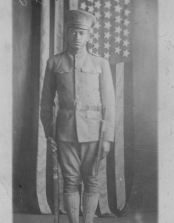PFC. Thomas C. Hawkins
Dec. 11, 1917
Thomas Coleman Hawkins was born in Graystone, North Carolina, on January 2, 1893. Thomas and his brothers and sisters spent their early years in a small home in Henderson, North Carolina. His was a very close-knit family, and he grew to become a deeply religious young man.
By the time Thomas decided to join the Army, his older brother Lewis Henry Hawkins had already enlisted, and was serving in H Troop of the 10th Cavalry Regiment. On October 19, 1914, Thomas traveled to Raleigh, North Carolina, and enlisted in I Company, 3rd Battalion, 24th Infantry Regiment, for a term of seven years. He was twenty-one years old.
The Army recognized his potential to be a good soldier, an assessment that was borne out by the fact that in July 1916, less than two years after enlisting, he was promoted to Private First Class. His military records categorized him as being a man of high intelligence who was both well-spoken and skilled in the use of written language. In fact, in his letters to his mother while he was serving in the Philippines, he wrote not only songs but also poetry. He served with distinction with the 24th Infantry in the Philippine Islands and with the Punitive Expedition into Mexico with General John “Black Jack” Pershing in 1916. On July 23, 1917, he arrived in Houston, Texas with his battalion, which was assigned to guard the construction of Camp Logan.
When chaos and confused firing broke out in the 3rd Battalion’s camp on the night of August 23, PFC Hawkins responded to the only military authority that was functioning in his unit area, and he fell in with his company when ordered to do so by his first sergeant, 1SG Vida Henry. Believing that they were moving out to engage an approaching armed mob, more than 100 soldiers, mostly from I Company, marched out of the cantonment in tactical military order under the leadership of their noncommissioned officers. PFC Hawkins was later accused of being among them, though the testimony against him was contradictory and unreliable.
In the aftermath of the violence that night, PFC Hawkins was one of 63 soldiers charged with participating in a mutiny, a charge the Army prosecution failed to prove to the required standard of military law. In this court-martial, US v. Nesbit, thirteen soldiers were sentenced to death by hanging. PFC Hawkins was one of the condemned. The night before his execution, PFC Hawkins wrote a final letter to his parents back in North Carolina:
Dear Mother & Father
When this letter reaches you I will be beyond the veil of sorrow I will be in heaven with the angels. Mother don’t worry over your son because it is heaven’s gain look not upon my body as one that must fill a watery grave but one that is asleep in Jesus. I fear not death, did not Jesus ask death, “Where are thy sting.” Don’t regret my seat in heaven.
In that letter he declared his innocence, telling his mother and father, “I am sentenced to be hanged for the trouble that happened in Houston, Texas although I am not guilty of the crime that I am accused of.”
